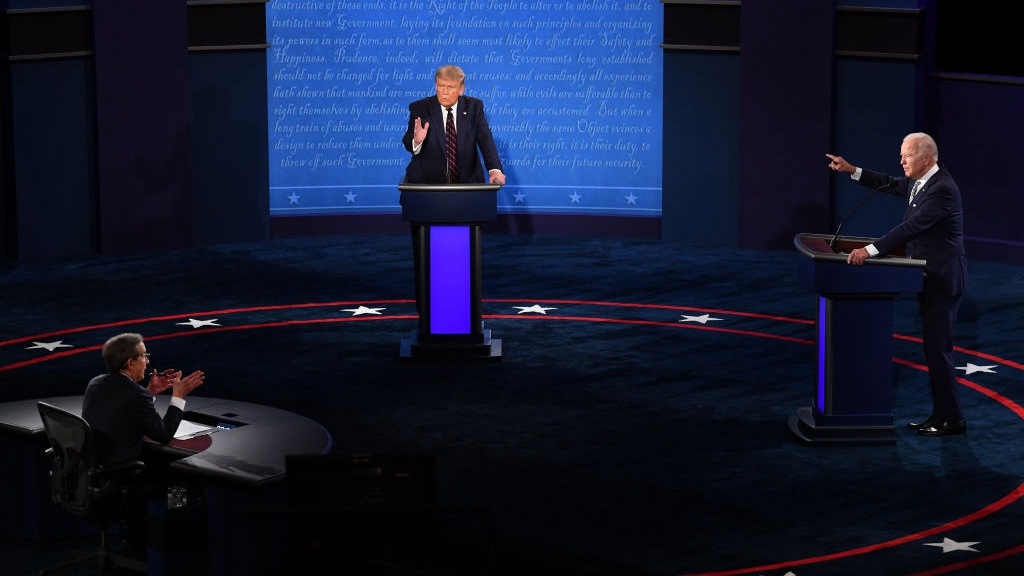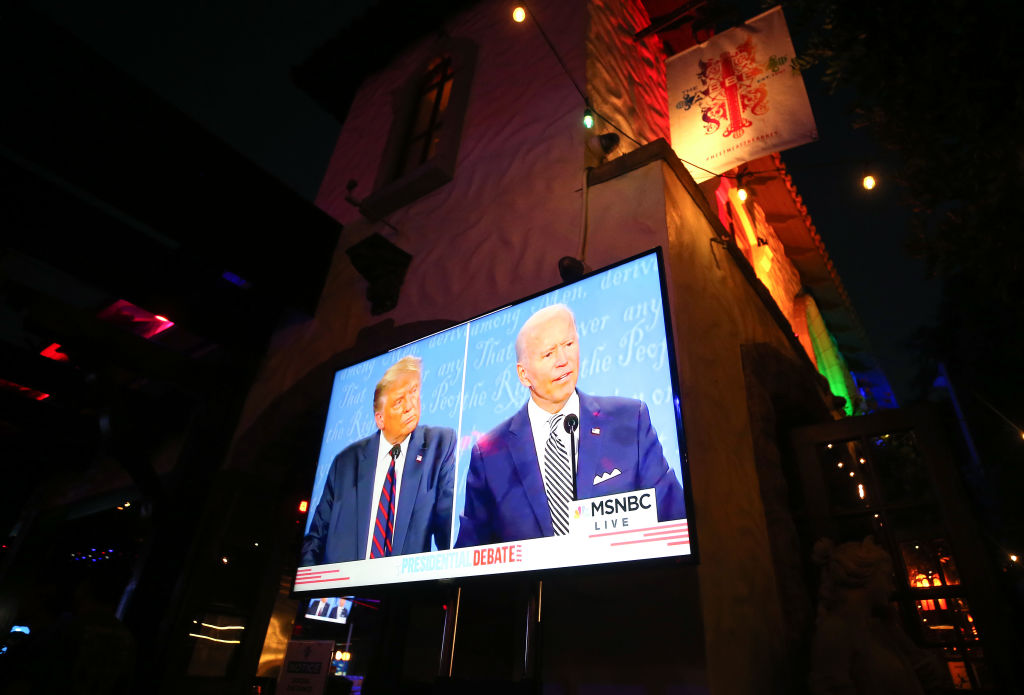
Joe Biden, 2020 Democratic presidential nominee, (R), U.S. President Donald Trump and moderator Chris Wallace speak during the first U.S. presidential debate hosted by Case Western Reserve University and the Cleveland Clinic in Cleveland, Ohio, U.S., September 29, 2020. /Getty Images
Joe Biden, 2020 Democratic presidential nominee, (R), U.S. President Donald Trump and moderator Chris Wallace speak during the first U.S. presidential debate hosted by Case Western Reserve University and the Cleveland Clinic in Cleveland, Ohio, U.S., September 29, 2020. /Getty Images
Editor's note: Hannan Hussain is a foreign affairs commentator and author. He is a Fulbright recipient at the University of Maryland in the U.S. and a former assistant researcher at the Islamabad Policy Research Institute. The article reflects the author's opinions and not necessarily the views of CGTN.
October 22 could be the last big chance for U.S. President Donald Trump and Democrat challenger Joe Biden to dominate airwaves before election day.
The second and final U.S. presidential debate on Thursday arrives on the back of a dramatic three-week interval, which saw Trump in and out of COVID-19 battles, a flurry of campaign rallies and wild allegations of foreign collusion.
The question is: Will muted mics and a six-point debate agenda give rise to a substantive, policy-intensive debate? Considering both candidates' eagerness to score favorable public appearances, the stakes in Thursday's debate remain sky-high.
Revving up voter momentum
In a massive turnaround from the first presidential debate build-up, nearly 32 million American voters have cast their ballot. For this reason alone, sidestepping questions that are central to voter motivations could prove counterproductive.
President Trump has indicated a high degree of sensitivity to voter motivations in recent days, campaigning in numerous battleground states, including Pennsylvania, by unveiling a new sales pitch: the case for COVID-19 and economic "recovery."
"This is an election between the Trump super recovery, which is happening right now, and a Biden depression," Trump announced this week.
This middle-ground between recovery and triumph is likely to constitute Trump's line of attack on Thursday as his administration gets probed for its shambolic COVID-19 handling during a separate pandemic segment.
Last month's debate made it clear that a mere signal to the disappearance of the virus – America's number one concern during the early voter phase – hurt the president's numbers and may discourage inroads into an undecided voter's psyche.
For Biden, delivering an articulate reading of why his future America matters is a must. Topics such as race in America, climate change, national security and leadership are likely to compliment the Trump administration's demonstrated weaknesses on COVID-19 containment. Against the backdrop of public diplomacy, the Biden campaign can once again reposition itself as a catalyst for wide-ranging, progressive domestic issues. Swathes of early voters already align with the Democrat party, and the fact that most voters prefer Biden over Trump on almost all major issues suggests Biden could add to that support's credibility on stage.

A broadcast of the first debate between President Donald Trump and Democratic presidential nominee Joe Biden is played in West Hollywood, California, September 29, 2020. /Getty Images
A broadcast of the first debate between President Donald Trump and Democratic presidential nominee Joe Biden is played in West Hollywood, California, September 29, 2020. /Getty Images
The anticipation that Trump may blur the line between actual policy gains and signature posturing is exactly what marked Biden's undoing in September. If Trump invoked the "greatest economy in the world" mantra on a pre-pandemic note, Biden went ahead and listed 100 million Americans with pre-existing health conditions. Trump called Biden out on the number, and there was no incentive in telling the two apart. The act lasted 90-minutes.
Biden's own team reveals the blueprint for circumventing another dogfight. "Biden's overarching goal is similar to the first debate, talking directly to the American people about how he would contain the coronavirus pandemic and rebuild the economy," a Biden advisor told CNN this week.
The orderly sequencing of the debate rules itself aligns with such an interpersonal approach to public engagement, an art of oratory exercised well by Biden's own vice presidential pick Kamala Harris.
Judging by Trump's coordinated attacks against political opponents this week and his campaign's stated goal to push Trump voters to "show up," there is little chance that the president would bother distinguishing controversial policies from his inherent America First posturing.
This puts the onus on Biden. He can appeal directly to the American people and deliver action points to millions of Americans in a single night. Biden's determination to detail his own plans surrounding health care and economic revival at the debate are suitable starting points, given that they coincide with Trump's diatribe against America's top health expert and the broader machinery involved in national recovery.
The case for electability
Who deserves the presidency – Trump or Biden? The verdict from the American public is still very open-ended. This makes the debate an important variable in validating voter commitments and in communicating campaign consistency.
Both Trump and Biden bring contrasting electability cases to the fore on Thursday. "We feel like we're in a good spot," one of the Trump campaign officials told TIME. This line of confidence stems from the strategies of Trump's close aides, who consider public polling – a Biden strong-point – a relatively loose measure to capture major voter patterns this year.
It is fair to point out that Republicans are also driving up their robust voter-registration campaign across key swing states, giving Trump the impression that ground-up mobilization will mark his triumph on November 3. The American people will get an up-close look at those motivations one last time.
A separate set of realities also constitute Biden's own confidence measure on Thursday, breaking new ground in the polls and retaining double-digit leads in states that, according to Trump, have the power to "win the whole thing."
Together, the presence of this electability silver lining leaves a moderate incentive to command public support. A candidate that can rise above such complacency will emerge as the difference.
(If you want to contribute and have specific expertise, please contact us at opinions@cgtn.com.)